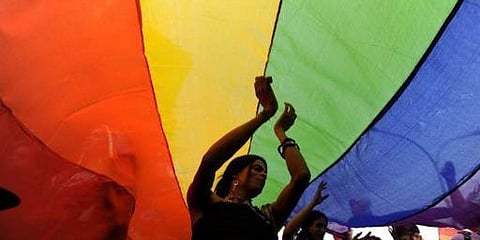

HYDERABAD: It has been two years when on September 6 gay sex was decriminalised by the Supreme Court, but have things really changed? Massive celebrations had taken place across the country when the SC decriminalised a part of Section 377 of the Indian Penal Code (IPC) to allow consensual sex among adults of the same gender, thus lifting a colonial-era law which had made the act of love ‘artificial and unnatural’.
We speak to Vishnu Teja, 26, a cis gay man, and a gay rights activist from the two Telugu states. “Being homosexuals, we are no longer criminals,” says he, but is quick to add, “The Union of India hasn’t taken any measures to ensure eliminating stigma associated with gender and sexual minorities.” For the uniniated, cis gender stands for a gender you are born with and identify with.
Justice Malhotra, one of the five judges had said in the judgment: “History owes an apology to the members of this community and their families, for the delay in providing redressal for the ignominy and ostracism they have suffered.” Vishnu comments, “However, neither the Prime Minister nor The President of India addressed the Nation regarding this historic judgement. India even abstained from voting in UNHRC about LGBTQI protection rights in 2019. the seriousness about our rights is missing.” He adds indignantly, “Despite SC judgment, many in the police and administration continue to refer to gay sex as ‘unnatural sex’.”
Has the LGBTQI+ community really been accepted by society? “It’s changing slowly with many from the community coming out to their families, friends and colleagues,” shares Vishnu, who also runs an NGO, ‘Liberty Rebellion Organization’ that works for male rights in India.
Getting emotional, Vishnu narrates, “It was a long battle for me to come out and even accept myself. I clearly remember how when the judgement was announced, I cried along with my mother and I can never forget that moment in my life.” While it upsets him that his late father never accepted him, he adds, “My mother’s acceptance gives me strength to live life with dignity.”
Vishnu informs that many gay persons committed suicide during the lockdown. He feels that the rich are more accepting of their child’s sexual orientation as compared to the middle-class. “With no jobs, many went back to staying with their parents and finding it difficult to come out of the closet, went into depression because of loneliness and unacceptance from the society.” He reveals: Due to family pressure, gay men are forced to marry women and then end up as criminals as their wives file cases of impotency, cheating and dowry harassment?”
He says that most homosexuals are easy targets for blackmailing, prostitution and harassment. Through his NGO, Vishnu wants to focus on men’s mental health, reproductive and sexual health, misuse of law, and violence. He says, “As my identity as cisgay man, I want to focus on sensitisation and awareness with different shareholders both from the government and non-government until the stigma is eliminated from deep-rooted patriarchal society.”
Struggles that still affect homosexuals
1. Family acceptance
2. Poor education
3. Unemployment
4. Forced marriages
5. Corrective rapes
6. Conversion therapies
7. Bullying
8. Workplace harassment